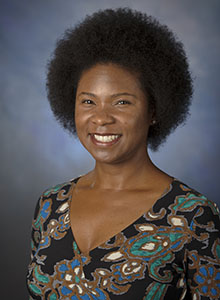Professors Challenge DOMA in Brief
Georgia State University College of Law associate professor Tanya Washington and two professors from the University of Denver's Sturm College of Law filed an amicus brief in United States v. Windsor on March 1. The case challenges the constitutionality of the Defense of Marriage Act's exclusion of same-sex married couples.
 Washington; Catherine Smith, associate professor of law at University of Denver's Sturm College of Law; and Susannah Pollvogt, adjunct professor of law at Denver's Sturm College of Law, focus their brief directly on arguments advanced by the Bipartisan Legal Advisory Group (BLAG) that DOMA is justified because it advances child welfare. Specifically, the advisory group asserts the act advances child welfare by providing a stable structure to raise unintended and unplanned offspring; encouraging the rearing of children by their biological parents; and promoting childrearing by both a mother and father.
Washington; Catherine Smith, associate professor of law at University of Denver's Sturm College of Law; and Susannah Pollvogt, adjunct professor of law at Denver's Sturm College of Law, focus their brief directly on arguments advanced by the Bipartisan Legal Advisory Group (BLAG) that DOMA is justified because it advances child welfare. Specifically, the advisory group asserts the act advances child welfare by providing a stable structure to raise unintended and unplanned offspring; encouraging the rearing of children by their biological parents; and promoting childrearing by both a mother and father.
The brief, in support of Windsor, advances two main points challenging BLAG's characterization of the Defense of Marriage Act as a child welfare measure. First, the act harms children because it inflicts immediate and concrete injuries on children whose parents' same-sex marriages are recognized by state law.
"Each of these purported justifications expresses and enforces a bare preference for the children of opposite-sex couples as the only children entitled to the type of permanency, stability and so-called "ideal" parenting arrangements that DOMA allegedly confers," the three professors argue in their brief.
In marriage equality states, children of same-sex married parents are identically situated to children of opposite-sex married parents, yet the act categorically excludes them from family-supporting rights, benefits and protections provided by the federal government.
In addition to exacting a legal and economic toll on children of same-sex married parents, the act stigmatizes all children of same-sex couples by declaring their families inferior to those headed by opposite-sex couples.
Second, The Defense of Marriage Act fails in its entirety because it serves an impermissible function: it punishes children of same-sex parents based on nothing more than moral disapproval of their parents' conduct.
"DOMA inflicts immediate, concrete injuries on a subset of these children, namely: those whose families would otherwise benefit from federal family supporting programs, but whose parents; marriages, while recognized on the state level, are rejected at the federal level," the three professors argue.
The respondents for Windsor cited the three professors' amicus brief in their brief to the Supreme Court.